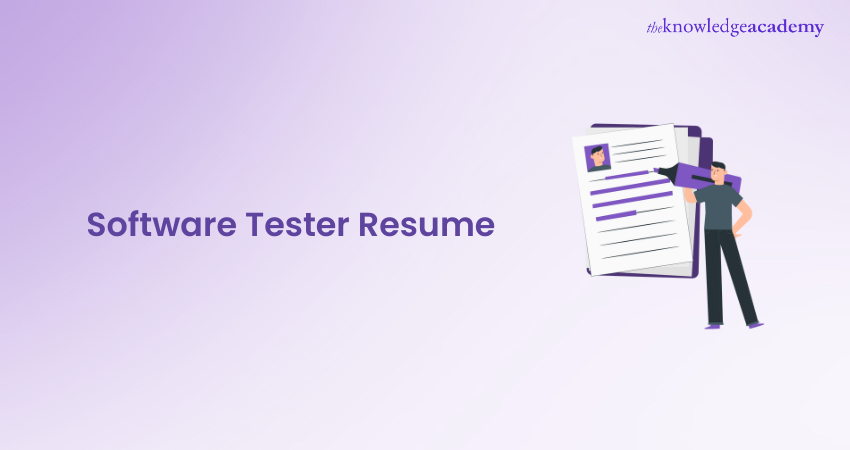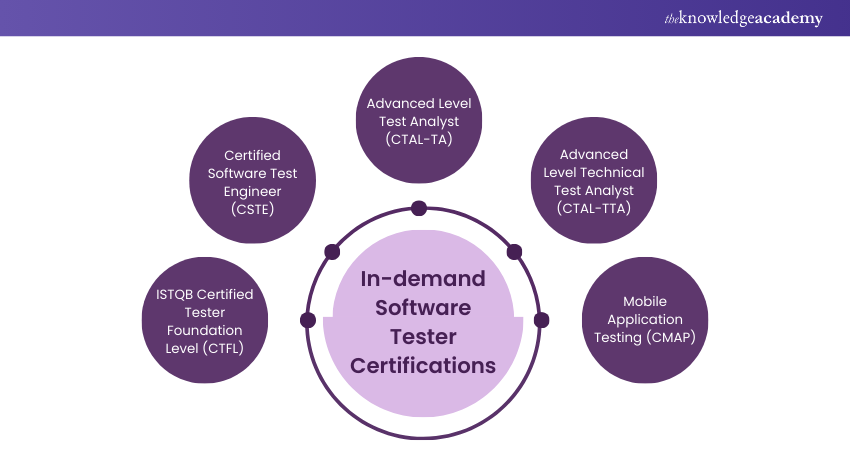We may not have the course you’re looking for. If you enquire or give us a call on +91-181-5047001 and speak to our training experts, we may still be able to help with your training requirements.
Training Outcomes Within Your Budget!
We ensure quality, budget-alignment, and timely delivery by our expert instructors.

In the world of Software Development, Software Testing stands as a trusted ally—a vigilant guardian that ensures software products perform flawlessly. Like a skilled debugger, it hunts down bugs, fine-tunes performance, and ensures seamless User Experiences.
But how did we arrive here? Back in 1948, Software Testing emerged alongside development, initially focused on bug fixes. Fast-forward to the 1980s, and testing evolved beyond isolated bugs—it now thrives in real-world scenarios. As software’s dominion expands across industries, the Software Tester’s role remains pivotal.
Imagine your Software Tester Resume as meticulously crafted code—a blueprint for your career ascent. Let’s unravel the secrets to creating an ideal resume that opens doors to thrilling opportunities in the ever-evolving world of Software Development. Ready? Let’s dive in!
Table of Contents
1) How to add a Software Testing certification onto your CV?
a) Choose the Right Format
b) Highlight Your Skill
c) Showcase Your Projects
d) Use Action Verbs
e) Proofread and Review
2) Relevant Certifications to Add on Resume
3) Avoid Misusage on Resumes
4) How to Add Your Software Testing Certification to Your LinkedIn
5) Conclusion
How to add a Software Testing certification to your CV?
Creating an impactful resume requires attention to detail and an unwavering focus on showcasing your strengths. Here are some essential tips to keep in mind:
Choose the Right Format
Align your resume format with the type of Software Testing job you’re seeking.
a) For Manual Testing roles, a chronological format highlighting work experience and achievements is ideal.
b) For Automation Testing roles, a functional format emphasising skills and projects works best.
c) Alternatively, a combination format blending both approaches can be effective.
Here’s an example:
|
Work Experience Senior Software Tester, XYZ Corp. (2020 - Present) Project lead on automated testing using [Software Testing tool name] for Banking software.
Software Tester, ABC Tech. (2018 - 2020) Spearheaded functional testing for healthcare software. |
Consider this example of a functional resume format:
|
Skills 1) Automated testing: Proficient with [Software Testing tool names]. 2) Data analysis: Experience with [Data analysis tools]. Here’s an example of a hybrid resume format: Skills 1) Manual Testing: Exceptional debugging skills with various manual testing tools. 2) Automated Testing: Proficient in scripting automated tests using [Software Testing tool names]. Work Experience 1) Lead Software Tester, [Company name]. (2017- Present) 2) Managed the transition from manual to automated testing process, increasing efficiency by 50%. |
Highlight your Skills
Include Software Testing skills relevant to the job description.
a) List tools, frameworks, methodologies, techniques, languages, and platforms.
b) Mention certifications, courses, or training that demonstrate your expertise.
c) Use keywords and phrases from the job description to align your skills with the employer’s expectations.
Consider this format for highlighting your skills:
|
Hard skills for your Software Tester resume 1) Automated testing tools 2) Manual testing 3) Test case creation 4) Knowledge of Agile/Scrum 5) Performance testing 6) Debugging 7) Knowledge of SQL databases Soft skills to include in your Software Tester resume 1) Analytical thinking 2) Attention to detail 3) Problem-solving 4) Effective communication 5) Time management 6) Team collaboration 7) Adaptability |
Showcase your Projects
Highlight your Software Testing experience and achievements through your projects.
a) Include those from previous or current jobs, freelance work, volunteer work, or personal projects.
b) Describe each project’s scope, goals, challenges, and results, and emphasise your role, responsibilities, and contributions.
c) Use metrics to quantify your impact and value.
Use Action Verbs
Utilise action verbs to describe your Software Testing skills and achievements, showcasing your initiative, leadership, and problem-solving abilities.
a) Examples include tested, debugged, automated, verified, validated, designed, implemented, documented, reported, or improved.
b) Avoid passive or vague verbs like worked, involved, or responsible.
Proofread and Review
Before sending your resume, proofread and review it for spelling, grammar, punctuation, and formatting errors.
a) Ensure clarity, conciseness, and consistency.
b) Utilise online tools, peer feedback, or professional services to refine your resume.
c) Tailor it to each job application, highlighting Software Testing skills that match specific requirements.
Consider this example for highlighting strong work experience and key projects:
|
Senior Software Tester XYZ Tech 2018 - Present 1) Developed and executed comprehensive test cases that increased defect detection by 30%. 2) Spearheaded a cross-functional team in the integration of automated testing processes for [Project name], reducing manual testing hours by 45%. 3) Championed the use of [Software Testing tool name] for automated testing, improving test efficiency by 40%. Key Projects 1) Project Phoenix: Led the implementation of automated tests, reducing manual testing effort by 45%. 2) Project Delta: Coordinated a team of 5 testers for end-to-end testing of [project], ensuring 99% accuracy before go-live. |
Looking to expand career opportunities and your reputation as a Sofware Testing Professional? Sign up for our ISTQB Advanced Test Automation Engineer Course now!
Relevant Certifications to Add on Resume
When adding certifications to your resume, choose those that are widely recognised and respected in the industry. Some notable Software Testing certifications include:

ISTQB Certified Tester Foundation Level (CTFL) – International Software Testing Qualifications Board
a) Offers broad understanding of key Software Testing principles and practices
b) Establishes a strong foundation for a Software Testing career
c) Covers fundamental topics such as Test design and Risk management
Certified Software Test Engineer (CSTE) – Quality Assurance Institute (QAI)
a) Enhances skills in software quality testing.
b) Focuses on critical areas like Test planning, Execution and Management.
c) Designed for experienced professionals.
d) Validates expertise and commitment to quality standards.
Advanced Level Test Analyst (CTAL-TA) – International Software Testing Qualifications Board
a) Suitable for those holding a CTFL certificate and seeking advanced knowledge.
b) Covers complex aspects of Software Testing such as Test analysis and Defect categorisation.
c) Ideal for specialisation in Analytical testing roles and User-oriented testing roles.
Advanced Level Technical Test Analyst (CTAL-TTA) – International Software Testing Qualifications Board
a) Focus on the technical aspects of Software Testing
b) Covers critical technical areas such as Non-functional testing and Test automation
Perfect for professionals aiming to become experts in technical testing challenges
Mobile Application Testing (CMAP) – International Software Testing Qualifications Board
a) This certification specialises in mobile application testing.
b) Covers mobile-specific topics such as Testing techniques, Tools and Platform-specific challenges.
c) Essential for roles in mobile software development and testing.
d) Keeps you ahead in the fast-evolving mobile field.
Make your mark in the world of Software Development with our Certified Software Testing Professional (CSTP) Training - Sign up now!
Avoid Misusage on Resumes
While crafting your resume, you need to avoid common pitfalls that often hinder resumes from catching the attention of employers. The most common among them involves misrepresenting Software Testing skills on a resume. This can backfire, damaging your credibility and professional reputation.
Employers rely on accurate depictions of a candidate's abilities to make informed decisions on recruitment. Exaggerating expertise in this technical field can lead to underperformance and missed project goals
Here are three examples of how Software Testing skills might be improperly reflected on a resume:
Summary Section
Claiming to be an "Expert in all forms of Software Testing, capable of single-handedly ensuring flawless software performance in all projects" when only experienced with basic manual testing methods.
Experience Section
Stating involvement in "Leading a team in implementing cutting-edge automated testing protocols for a software project," despite only having observed the process.
Achievements Section
Listing "Dramatically increased software deployment speed by 70% through innovative test automation strategies" without having directly contributed to or measured these improvements.
Conclusion
Creating a standout Software Tester Resume involves showcasing a blend of your technical skills, certifications, and practical experiences while maintaining a professional and error-free format. By following the examples and expert tips provided in this blog, craft a resume that captures the attention of hiring managers.
Unlock your potential as a Software Tester with our ISTQB Software Testing Foundation Training – Sign up now!
Frequently Asked Questions

The following common testing strategies include Black Box Testing (Tests the software's functionality without focusing on the internal code structure), White Box Testing (Tests the internal code structure and logic) and Unit Testing (Tests individual components of the software to ensure that they are functioning as intended).

Key challenges include communication issues, lack of resources or limited resources, dealing with changes, time constraints, missing documentation. Additional challenges include inadequate testing, unstable environment and compatibility issues.

The Knowledge Academy takes global learning to new heights, offering over 30,000 online courses across 490+ locations in 220 countries. This expansive reach ensures accessibility and convenience for learners worldwide.
Alongside our diverse Online Course Catalogue, encompassing 17 major categories, we go the extra mile by providing a plethora of free educational Online Resources like News updates, Blogs, videos, webinars, and interview questions. Tailoring learning experiences further, professionals can maximise value with customisable Course Bundles of TKA.

The Knowledge Academy’s Knowledge Pass, a prepaid voucher, adds another layer of flexibility, allowing course bookings over a 12-month period. Join us on a journey where education knows no bounds.

The Knowledge Academy offers various Software Testing Courses, including the ISTQB Software Testing Foundation Course and Certified Software Testing Professional (CSTP) Course. These courses cater to different skill levels, providing comprehensive insights into Software Tester Roles And Responsibilities.
Our Programming & DevOps Blogs cover a range of topics related to Software Testing, offering valuable resources, best practices, and industry insights. Whether you are a beginner or looking to advance your Software Testing skills, The Knowledge Academy's diverse courses and informative blogs have got you covered.
Upcoming Business Analysis Resources Batches & Dates
Date
 ISTQB Software Testing Foundation
ISTQB Software Testing Foundation
Mon 6th Jan 2025
Mon 3rd Feb 2025
Mon 17th Feb 2025
Mon 3rd Mar 2025
Mon 17th Mar 2025
Mon 31st Mar 2025
Mon 28th Apr 2025
Mon 19th May 2025
Mon 2nd Jun 2025
Mon 16th Jun 2025
Mon 30th Jun 2025
Mon 14th Jul 2025
Mon 28th Jul 2025
Mon 11th Aug 2025
Mon 8th Sep 2025
Mon 22nd Sep 2025
Mon 6th Oct 2025
Mon 20th Oct 2025
Mon 3rd Nov 2025
Mon 17th Nov 2025
Mon 1st Dec 2025
Mon 15th Dec 2025







 Top Rated Course
Top Rated Course



 If you wish to make any changes to your course, please
If you wish to make any changes to your course, please


